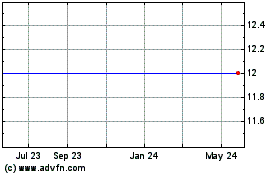Depressed Patients Showed Improvement with Lexapro(TM) After Failure with Initial SSRI Treatment
May 06 2004 - 7:39PM
PR Newswire (US)
Depressed Patients Showed Improvement with Lexapro(TM) After
Failure with Initial SSRI Treatment NEW YORK, May 6
/PRNewswire-FirstCall/ -- Forest Laboratories, Inc. today announced
the results of a clinical study, which found that Lexapro(TM)
(escitalopram oxalate) is a beneficial and well-tolerated treatment
for depressed patients who failed to respond to initial
antidepressant therapy with any one of four other selective
serotonin reuptake inhibitors (SSRIs). In addition, 60 percent of
patients who were switched to Lexapro responded and more than 40
percent achieved remission of depressive symptoms after failing
initial antidepressant therapy. The findings were presented at the
157th annual meeting of the American Psychiatric Association in New
York. (Logo:
http://www.newscom.com/cgi-bin/prnh/20001011/FORESTLOGO ) "Forty
percent of patients achieving remission from Lexapro after not
responding to another SSRI is remarkable," said Dan L. Zimbroff,
M.D., lead study investigator and medical director of the Pacific
Clinical Research Medical Group in San Bernardino, California.
"These results bring hope for both doctors and patients who have
experienced difficulty in finding an effective treatment option."
Depression affects nearly 19 million adult Americans and costs the
United States an estimated $44 billion each year. Symptoms of
depression often include frequent feelings of worthlessness or
guilt, difficulty concentrating, loss of interest in activities,
and a change in eating or sleeping habits. The World Health
Organization predicts depression will become the leading cause of
disability by the year 2020. Study Conclusions At the end of the
eight-week treatment period, Lexapro was shown to be beneficial and
well tolerated in patients who did not respond to initial SSRI
therapy, including Zoloft(R) (sertraline hydrochloride), Prozac(R)
(fluoxetine hydrochloride), Celexa(TM) (citalopram HBr), and
Paxil(R)(paroxetine hydrochloride). Approximately 60 percent of
previously, non-responding patients met the criteria for response
and more than 40 percent achieved remission of depressive symptoms
when treated with Lexapro. Regardless of which SSRI treatment
patients were started on, Lexapro was beneficial in achieving
response and remission. Remission was defined as a MADRS score of
less than or equal to 10 and represents a resolution of depressive
symptoms and restoration of normal functioning. In the study,
non-responders to initial SSRI therapy were safely switched to
Lexapro within 24 hours. Lexapro was well tolerated, with only 6.6
percent of patients withdrawing from the study due to adverse
events associated with Lexapro treatment, following therapy with
another SSRI. Headache was the only adverse event reported by more
than 10 percent of the patients treated with Lexapro following
treatment with another SSRI. Study Methodology Five hundred and
fifteen patients, ages 18 to 65 with major depressive disorder
(baseline MADRS score greater than or equal to 22), participated in
an eight-week, lead-in treatment period with an initial SSRI.
Patients were randomized to receive open-label, flexible dose
treatment of citalopram (20-60 mg per day; N=131), sertraline
(50-200 mg per day; N=127), paroxetine (20-50 mg per day; N=128),
or fluoxetine (20-80 mg per day; N=129). At the end of the lead-in
period, 137 patients who completed the trial and did not respond to
initial treatment (MADRS >12) participated in an eight-week,
open-label trial of Lexapro at 10-20 mg per day. Patients were
switched to Lexapro within 24 hours of discontinuing initial
treatment. Response at the end of the lead-in treatment period was
defined as a MADRS score less than or equal to 12. At the end of
the Lexapro treatment period, response was defined as at least a 50
percent reduction in MADRS scores from the beginning of the lead-in
treatment period. Remission was defined as a MADRS score of less
than or equal to 10. About Lexapro Lexapro is the newest and
fastest-growing selective serotonin reuptake inhibitor (SSRI) and
has been prescribed for more than 4.5 million patients in the U.S.
Lexapro was approved by the U.S. Food and Drug Administration (FDA)
in August 2002 for both the initial and maintenance treatment of
major depressive disorder and in December 2003 for the treatment of
generalized anxiety disorder. Lexapro is available as tablets and
oral solution. As with all SSRIs, Lexapro should not be taken with
monoamine oxidase inhibitors (MAOI). As with other psychotropic
drugs that interfere with serotonin reuptake, patients should be
cautioned regarding the risk of bleeding associated with the
concomitant use of Lexapro with NSAIDs, aspirin, or other drugs
that affect coagulation. Patients with major depressive disorder,
both adult and pediatric, may experience worsening of their
depression and/or the emergence of suicidal ideation and behavior
(suicidality), whether or not they are taking antidepressant
medications, and this risk may persist until significant remission
occurs. Although no causal role for antidepressants in inducing
such behaviors has been established, patients being treated with
antidepressants should be observed closely for clinical worsening
and suicidality, especially at the beginning of a course of drug
therapy, or at the time of dose changes, either increases or
decreases. Forest Laboratories licenses Lexapro from H. Lundbeck
A/S, the Danish pharmaceutical firm that developed escitalopram and
citalopram. About Forest Laboratories and Its Products Forest
Laboratories' growing line of products includes: Lexapro(TM), an
SSRI antidepressant indicated for the initial and maintenance
treatment of major depressive disorder and for generalized anxiety
disorder; Celexa(TM), an antidepressant; Namenda(TM), an
N-methyl-D-aspartate (NMDA)-receptor antagonist indicated for the
treatment of moderate to severe Alzheimer's disease; Tiazac(R), a
once-daily diltiazem, indicated for the treatment of angina and
hypertension; Benicar(R),* an angiotensin receptor blocker
indicated for the treatment of hypertension; Benicar HCT (TM), an
angiotensin receptor blocker and diuretic combination product
indicated for the second- line treatment of hypertension; and
Aerobid(R), an inhaled steroid indicated for the treatment of
asthma. * Benicar(R) is a registered trademark of Sankyo Pharma,
Inc. Except for the historical information contained herein, this
release contains "forward-looking statements" within the meaning of
the Private Securities Reform Act of 1995. These statements are
subject to risks and uncertainties that affect our business,
including risk factors listed from time to time in the Company's
SEC reports, including the Company's Annual Report on Form 10-K for
the fiscal year ended March 31, 2003 and Quarterly Report on Form
10-Q for the period ended June 30, 2003, September 30, 2003, and
December 31, 2003. Actual results may differ materially from those
projected.
http://www.newscom.com/cgi-bin/prnh/20001011/FORESTLOGODATASOURCE:
Forest Laboratories, Inc. CONTACT: CHARLES E. TRIANO, Vice
President - Investor Relations of Forest Laboratories, Inc.,
+1-212-224-6714,
Copyright
Forest Road Acquisition (NYSE:FRX)
Historical Stock Chart
From Sep 2024 to Oct 2024

Forest Road Acquisition (NYSE:FRX)
Historical Stock Chart
From Oct 2023 to Oct 2024
